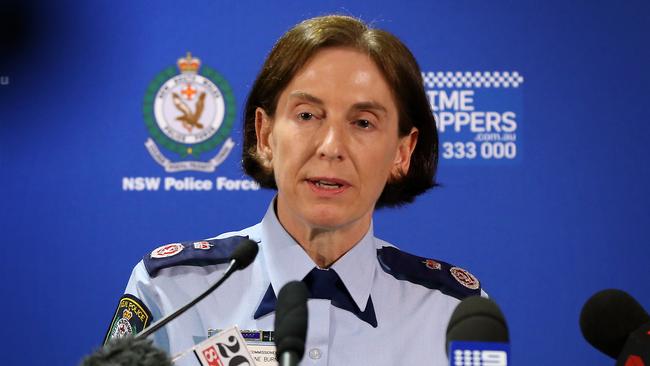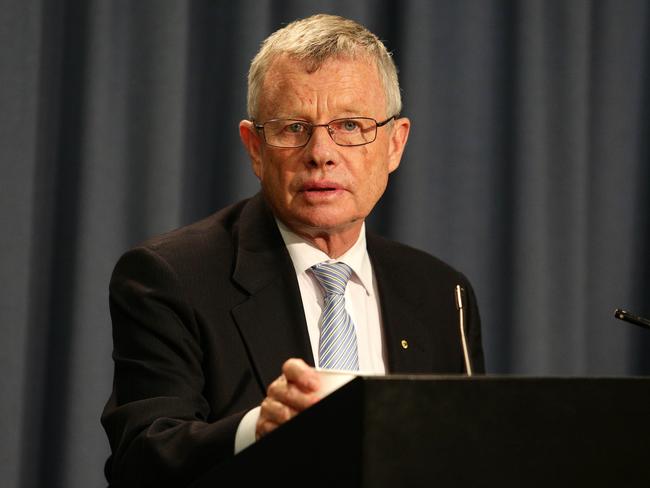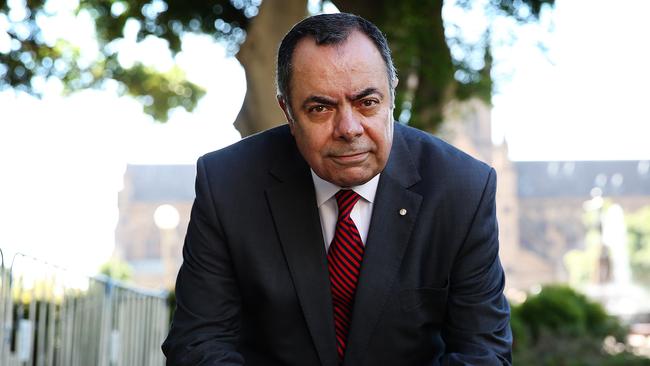Operation Prospect: Police bugging report released by ombudsman
NSW Police deputy commissioner Cath Burn has spoken out in the wake of the release of a report into the NSW police bugging scandal, saying the allegations against her “were always agenda-driven and entirely without foundation”.
NSW
Don't miss out on the headlines from NSW. Followed categories will be added to My News.
DEPUTY Commissioner Cath Burn has been slammed by the long-awaited report into the NSW police bugging scandal for conduct said to be “unlawful” or “unreasonable”.
The state’s counter-terrorism chief was a detective chief inspector and commander of the Special Crime Unit within the police Special Crime and Internal Affairs unit when the bugging operation, called Mascot, began in 1999.
Acting ombudsman Professor John McMillan tabled the final report into his office’s long-running Operation Prospect investigation in state parliament today.

Ms Burn released a statement tonight, saying she has been the “subject of flagrant and unsubstantiated accusations of dishonest and corrupt conduct in connection with my role as team leader of the Mascot investigations” for many years.
“Secrecy constraints placed me in the invidious position of being completely unable to correct the record and protect my reputation from continual and malicious attacks as part of a campaign to damage my reputation,” Ms Burn said in a statement released by NSW Police Media.
“I am pleased that the Ombudsman’s report has exonerated me in respect of these serious allegations. They were always agenda-driven and entirely without foundation. I have never sanctioned, authorised or pursued illegal tapping of police officers.”
READ CATH BURN’S OPERATION PROSPECT STATEMENT IN FULL

The report has not revealed who or how many have been referred to the Director of Public Prosecutions for consideration to be given to putting them before the courts. Mr McMillan said he has not done this as a “matter of fairness”.
“The decision to prosecute is a matter for the DPP, having regard to the matters investigated by Operation Prospect and any submissions the parties choose to make to the DPP. It is appropriate to protect the identity of individuals while those matters are under consideration by the DPP,” the report states.
It came after former deputy police commissioner Nick Kaldas failed in his attempt to secure an injunction blocking the document.
The NSW Ombudsman’s report into one of the force’s darkest episodes has found that “it was not uncommon that a person who was targeted for investigation by the Mascot Task Force would be named on multiple listening device and telephone interception warrants”.
READ THE FULL REPORT INTO OPERATION PROSPECT
“Some warrants named more than 100 people, and some people were named on close to 100 warrants,” the report states.
The report also made adverse findings against other former members of police internal affairs and the former head of the powerful NSW Crime Commission, Phillip Bradley.
But the most senior officer still serving from those days is Ms Burn, who was the leader of Mascot. She has always denied any wrongdoing.

Mascot was a joint police, crime commission and Police Integrity Commission task force set up in February 1999 to investigate allegations made by a corrupt former police officer codenamed Sea or M5.
Dozens of officers were bugged, including Ms Burn’s former fellow deputy commissioner Nick Kaldas, who was then head of Homicide.
MORE: Attempt to block bugging report lost
The Ombudsman found Ms Burn’s conduct in the use of an informant known as “Paddle”, who M5 claimed had been verballed by police in relation to an attempted armed robbery, was “unlawful conduct” under the Police Act.
She prepared two memos on March 22 and May 23 in 2002 which “contained misleading
or inaccurate information”.
The purpose of the documents was to advise senior officers about the nature and status of serious allegations that had been made against police officers.
“It was important that accurate advice was prepared, or that appropriate reservations or qualifications were made about the reliability of the analysis and advice in the memorandums,” Mr McMillan found.

“Burn was the team leader with management and supervisory responsibilities for planning and executing the deployment of a NSW Crime Commission informant in a manner that constituted a breach of the informant’s bail condition on two occasions.”
The Ombudsman, who has used codenames for most of the bugged officers, has found Ms Burn’s conduct as the leader of the team that investigated Officer P through the use of listening devices and telephone intercepts and an integrity test was “unreasonable conduct”.
The term “unreasonable conduct” is clarified by the Ombudsman as “the issue is whether, viewed objectively, particular conduct was not based on reason or good sense, or displayed poor judgment in the circumstances”.
Mr McMillan has found that in the case of Officer P, the investigation relied on weak information (including hearsay information) that was not properly tested or assessed in the context of other available information, and there was a failure to explain adequately the connection between the information available and the use of intrusive investigation techniques
to investigate an allegation against Officer P.
“Some warrants named more than 100 people, and some people were named on close to 100 warrants.”
“Burn was aware of or approved many of the steps that were taken in the investigation of Officer P, and was in a position to exercise better control over the investigation,” the report states.
Ms Burn was also criticised for jointly implementing the investigation strategy to investigate Officer F “in which Burn played an active role” but which was based on allegations or statements that were either inaccurate or misrepresented and there should have been a more objective evaluation made.
“Burn was in a position to require that a thorough assessment of that kind should have been undertaken,” the report said.
The Ombudsman has recommended the NSW Crime Commission and NSW Police Force apologise to a more than a dozen officers over the bugging operation, dubbed Project Mascot, begun in 1999.
He has also recommended that the government set up a Public Interest Monitor in NSW, similar to those already operating in Queensland and Victoria, to oversee applications for bugging warrants.
The police have released a formal statement: “The NSW Police Force has today received the Ombudsman’s Report into Operation Prospect.
“The report’s detailed findings and recommendations require careful consideration before NSW Police is in a position to respond formally. There will be no comment until that consideration has occurred.”


